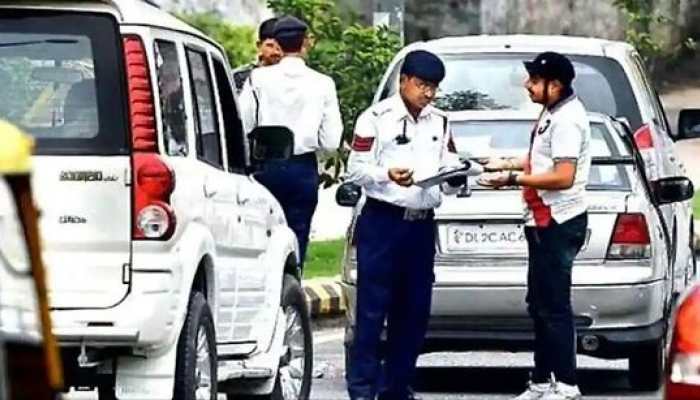


The Delhi Traffic Police has started cracking down on violators of the Graded Response Action Plan (GRAP) III in the national capital. On the first day of the ban on BS III petrol and BS IV diesel vehicles, around 550 challans were issued with a total fine of over Rs 1 crore. Additionally, 4,855 vehicles were also fined for not having a valid Pollution Under Control Certificate (PUCC). The ban also extends to inter-state buses from NCR cities into Delhi. Traffic police have intensified checking and returned over 300 prohibited vehicles, prosecuting those without PUCC certificates. This comes as the city faces severe air pollution levels and the Delhi government implements restrictions under stage III of the GRAP.
Delhi Police Intensifies Crackdown on Pollution Violators Amid Severe Air Quality
Background:
Delhi has long been battling severe air pollution, with vehicle emissions being a major contributing factor. To combat this, the city government has implemented the Graded Response Action Plan (GRAP), a set of measures aimed at reducing pollution based on air quality severity.
Current Crackdown:
Recently, the Delhi Traffic Police launched a crackdown on violators of GRAP III, which was implemented due to the deteriorating air quality. On the first day of the ban on BS III petrol and BS IV diesel vehicles, 550 challans were issued, totaling over Rs 1 crore in fines. Additionally, 4,855 vehicles were fined for not possessing a valid Pollution Under Control Certificate (PUCC).
The ban also extends to inter-state buses from neighboring cities entering Delhi. Traffic police have stepped up inspections and turned back over 300 prohibited vehicles, prosecuting those without PUCC certificates.
Top 5 FAQs:
1. What is the Graded Response Action Plan (GRAP)?
GRAP is a set of measures designed to reduce air pollution in Delhi based on the severity of air quality. It consists of four stages, with Stage I involving advisory measures and Stage IV imposing the most stringent restrictions.
2. What is the ban on BS III and BS IV vehicles under GRAP III?
Under GRAP III, BS III petrol and BS IV diesel vehicles are prohibited from entering Delhi. These vehicles fail to meet stricter emission standards and contribute significantly to air pollution.
3. What is a Pollution Under Control Certificate (PUCC)?
A PUCC is a certificate issued to vehicles that have passed an emission test. It indicates that the vehicle meets the prescribed emission standards.
4. Why are inter-state buses from NCR cities banned under GRAP III?
These buses often contribute to air pollution in Delhi. The ban aims to reduce the number of diesel vehicles entering the city.
5. What are the penalties for violating GRAP?
Violating GRAP can result in fines ranging from Rs 5,000 to Rs 20,000, depending on the nature of the violation.
Conclusion:
The Delhi Traffic Police's crackdown on pollution violators is a necessary step to improve air quality in the national capital. By enforcing restrictions on polluting vehicles and issuing fines, the authorities aim to discourage violations and contribute to a cleaner and healthier environment for Delhi's residents.

Prime Minister Narendra Modi launched a new high-speed train, Vande Bharat Express, running through the cities of Banaras and Khajuraho in Madhya Pradesh. The train, which is part of the country's four new Vande Bharat trains, is a symbol of speed, progress, and pride. This development aims to improve connectivity between major cultural and religious destinations in India, promoting tourism and boosting the local economy. With its rich history and famous temples, Khajuraho is set to become an even more popular destination among domestic and international travelers.

In a commemorative event organized by the department of language and culture, the district administration and KBN College, Vijayawada came together to celebrate the 150th anniversary of the National Song 'Vande Mataram'. Health Minister Y Satya Kumar Yadav urged citizens to draw inspiration from the song and actively participate in building a strong and developed India. The event also saw over 3,000 students sing Vande Mataram in unison and a live address from Prime Minister Narendra Modi. The song was praised for its ability to unite Indians during the freedom struggle, transcending barriers of caste and religion.

Get ready to honor and commemorate Guru Nanak's birth on November 7th, 2025! Also known as Gurpurab or Guru Nanak Prakash Utsav, this special day is celebrated around the world with devotion, reflection, and spiritual growth. Embrace the significance and teachings of Guru Nanak and experience a day of inspiration and enlightenment.

Kartik Purnima, also known as Dev Deepawali, is a divine version of Diwali celebrated by the gods themselves. It marks the triumph of Lord Shiva and the birth of Lord Kartikeya, and is observed by lighting diyas along the riverbanks and offering prayers to the gods. From Varanasi to Tamil Nadu, this festival brings together humans and the divine, reminding us that sincere devotion can make even the gods celebrate.

As the holy festival of Guru Nanak Jayanti approaches, Sikhs all over the world prepare to celebrate the birth anniversary of Guru Nanak Dev Ji, the founder of Sikhism and the first of the ten Sikh Gurus. The day is marked by acts of worship, remembrance, and spiritual enlightenment as people honour the profound teachings of Guru Nanak Dev Ji. Through prayers, kirtans, langars, and seva, the celebration promotes love, harmony, and unity, reminding us of the importance of compassion and devotion in our lives. Don't miss out on the date, history, significance, and rituals of this blessed occasion.

A UPS cargo plane experienced a catastrophic crash at Louisville's airport, resulting in at least three fatalities and 11 injuries. The plane was bound for Honolulu but crashed shortly after takeoff, causing a large fire and plumes of smoke. The status of the flight crew is currently unknown, and there are concerns about potential environmental issues from the impact. Emergency responders are on the scene and investigations from the FAA and NTSB are underway.

As the celebration of Guru Nanak Jayanti, also known as Gurpurab, approaches, indianexpress.com has compiled a list of the best wishes to share with friends and family. This important Sikh festival, which marks the birth anniversary of Guru Nanak Dev Ji, is observed on the full moon in the Hindu month of Kartik. On this sacred day, may the blessings of Guru Nanak Dev Ji fill your life with peace, happiness, and prosperity, and may your actions reflect the teachings of the Guru. Let's celebrate by spreading kindness and compassion instead of noise and pride.

The Board of Control for Cricket in India (BCCI) will be securing its copyrights for the years 2021 to 2025, protecting its rights over any usage of its content, logos, and trademarks. This move is in line with the BCCI's continuous efforts to maintain control over its intellectual property, ensuring its protection against unauthorized usage. Fans and stakeholders can follow BCCI's official social media accounts and website for updates on its activities and policies, and can also refer to the latest terms and conditions and privacy policy for any inquiries.

The Swamy Venkateswara Temple in Andhra Pradesh's Srikakulam district witnessed chaos on Saturday as a stampede broke out during the devotee rush on the auspicious occasion of Ekadashi. At least 10 people, mostly women, lost their lives while several others were injured. The incident occurred due to overcrowding, triggering panic and a crush among the tightly packed devotees. Chief Minister N Chandrababu Naidu expressed grief and directed authorities to provide immediate assistance to those affected.

On the occasion of National Unity Day, Indo-Tibetan Border Police (ITBP) personnel put on a spectacular display at the Statue of Unity. Superintendent of Police Amol Tambe spoke at the event and emphasized the importance of preserving the unity and integrity of India, in accordance with Sardar Vallabhbhai Patel's vision. This event serves as a reminder for citizens to come together and honor the country's strength in unity.